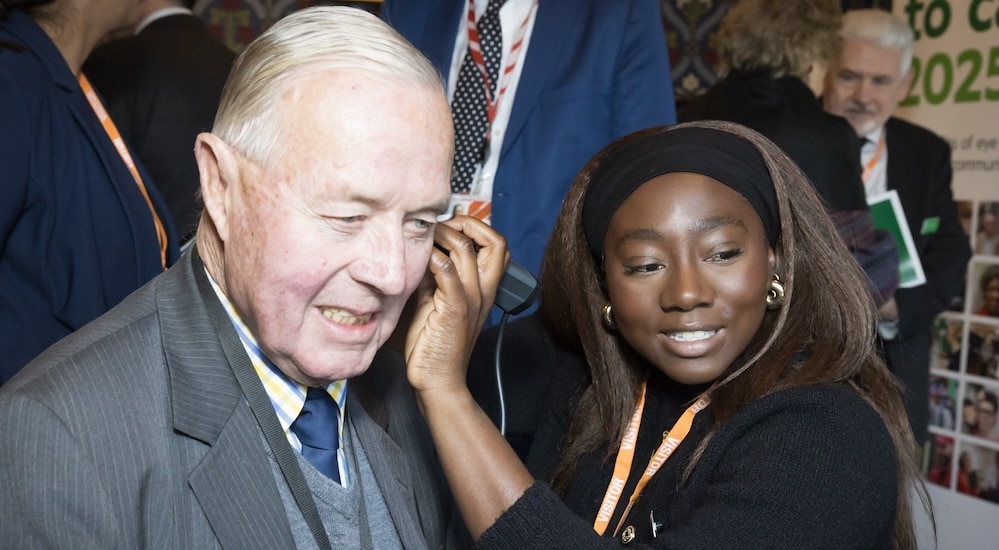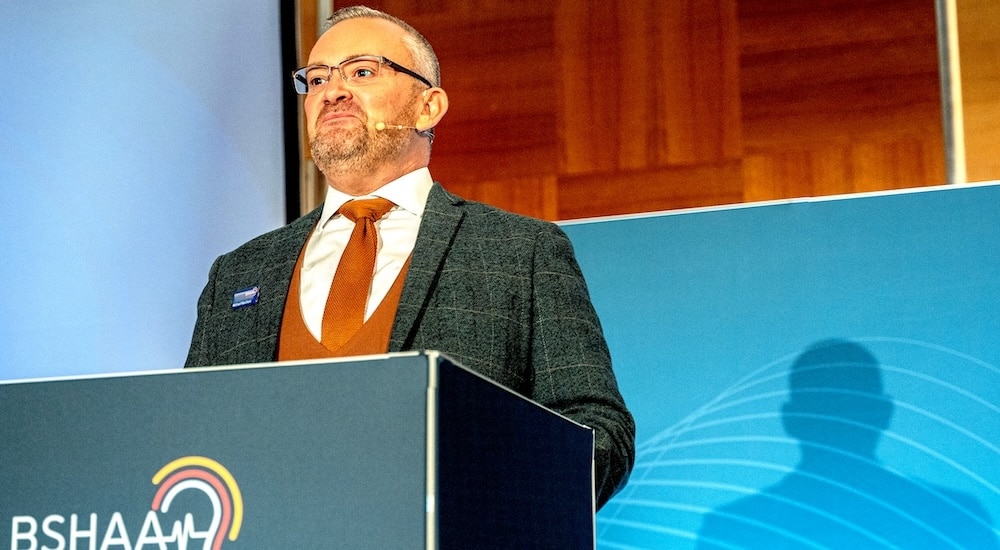THE WAY FORWARD FOR UK AUDIOLOGY - An interview with Professor Adrian Davis
Prof. Adrian Davis OBE is a voice that channels wisdom on the translation of audiological research into professional and administrative hearing healthcare. He tells AWN editor-in-chief Peter Wix how the way forward relates to past efforts he helped lead to modernise audiology in the UK.

Through science and standards to modernisation of hearing health

Audiology Worldnews (AWN): Any way forward is conditioned by the route so far. How far have we travelled in audiology on your watch?
Adrian Davis (AD): It was probably about 1996/97 when I talked to the people at the RNID [Royal National Institute for Deaf] board and said the way forward is digital and we need to change what we do.They took that to the next level, to political level, and then came back to me at a scientific level and asked if we could implement a modernised hearing aid service. And I said, yes, of course we can. I talked intensively with Professor Stuart Gatehouse and Professor Brian Moore and other people I knew around the world. What would modernised hearing aid services look like? Science based, obviously, with people who are perfectly trained and of whom there were enough people to deal with the demand within the system.
Demythologising the NHS/Private issue
AWN: The overall picture of hearing health in the UK must take in both the NHS and the private sector. What sort of questions were you looking at?
AD: We did try to bring on board the whole of the private sector and to demythologise the whole issue, asking what were the myths that people have about the private sector and about the NHS? And how do we disperse those myths so that we can collaborate together and work hand in hand?
And the first argument was, well, what we need is standards. We need proper standards and proper standard operating procedures. And if we can do that, to a certain extent, it doesn’t really matter who provides the service, providing those standards are adhered to. And the outcomes that we get are good. I think the first thing that I did was run a trial between the NHS service and the private sector service, working to the same specifications, and there were no differences.
So to my mind, and to the Department of Health, this meant that you could use the private sector working to the same specification and achieve the same outcomes. And in some ways, that led to Any Qualified Provider [AQP] type arrangements, which was much wider – it’s across the whole of health, remember!
So particularly within hearing, that was an important thing that we did. But this was only the beginning of trying to understand the pathway that people go through, thinking that maybe there was a problem with their hearing, or their communication partners thinking there’s a problem. Where do you go? What do you do? And if we’re providing a service free of charge at the point of delivery, which we are within the NHS and within AQP, then what does that service look like? And what should people expect?

No good for patients and hearing care professionals to have different expectations
AWN: How successful were you in matching expectations to outcomes?
AD: What should they expect in terms of protocols and in terms of the outcomes that we expect? It’s no good the expectations of the people who have problems being different to those of the professions, the audiologists, the speech language therapists, and other people who are supplying those services.
And very much there was a difference, I think, in perspective between primary care and consultant-led care, ENT care, and audiology care, and to a certain extent that still exists, but we only did half the job. So half the job was that we got a very competitive deal to provide digital hearing aids within the NHS . We revised the whole protocol for fitting based on proper scientific studies about how hearing aids should be programmed for individuals, and trained audiologists and audiologists-to-be about those scientific principles. So that that was a great advance and brought us up to some of the best trained audiology services in the world, certainly the most efficient audiology service in the world and the most value for money audiology, I believe.
The way forward to a more relevant service
AWN: So, where are we today, and how do we go forward in audiology in the UK?
AD: Technology has now moved on, professions have moved on, the NHS has moved on, and we need to complete that transformation
One of the biggest gains in terms of our understanding of science and service provision has been what we had to do in Covid. Covid was a nightmare, but it was also a blessing in disguise, and in that we had to see what is most essential about what we are doing, which is communicating. What is most essential about that service and what can we do if we can’t sit face-to-face? What can we do for people? Because the need is still there and it’s very urgently there, as all my work points out, that actually the number of people that could benefit from a hearing service is probably ten to fifteen times greater than those who do benefit at the moment, maybe less if your take other considerations into account but certainly many times more.
And we can’t do it. It’s too expensive. But if we harness technology, artificial intelligence, machine learning, the latest improvements in hearing aids and in therapy and cognitive neuroscience, then I’m sure that we can provide a much more relevant service, accessibility to that service, provision of that service, and better outcomes for people and their families than we have at the moment.
So we need to take this advantage now before it’s too late because people have acclimatised to the fact that actually we can do things that are remote. We can programme hearing aids remotely, we can assess people’s hearing remotely, we can do ecological momentary assessments of people’s hearing and their benefit,… So we know where science is going, yet we’re still 15 years late in applying it into the clinics. And so we need this huge shift, I think, in our mentality for what we’re doing in hearing services.

The education and training to produce mentally agile audiologists
AWN: What moves will foment such a big mindset shift and provide the conditions to optimise the intelligence of audiologists coming through the system?
AD: We know that one of the major issues around the health services, the staffing, and the training of people, the education of people in the health service – whether it’s doctors, nurses, physios, audiologists, clinical engineers, pathologists, haematologists – we know the key thing to success is appropriate education and training.
I emphasise education because one of the key things that people said to me while we were doing modernised hearing aid services, is “Adrian, why do we have to change what we do?” The whole point of education is how you cope with change.
And that is what we need to be working with people, saying that today is the occasion of the integrated care service, today is where we work with services for the ageing, with services for people with cognitive impairment, or people with difficulty in their movement. Today is when we try to integrate that care, so we’re not just dealing with a pair of ears or a bad shoulder or a bad knee; we are looking at the individual as a whole, and audiologists need that training that enables them to do that on a par with other specialists who are doing that in the system, so that there’s a parity of esteem between the consultants in orthopaedics, in ENT, and audiology. And we need people to learn how to change what they do as science changes and informs us about what is the best pathway for people and what are the outcomes that we’re looking for and how we know when we’ve got that.
It’s about employing people’s intelligence to the optimum, yes.

The big ship NHS is slow to change tack
AWN: You mentioned that you were able to see at some point that care could be given on the same level in the private sector as by the NHS but you also recognise that myths pervade. What are the vagaries of perception that apply to this private/public duopoly?
AD: Perception plays a big role in what we understand, whether the NHS practitioners think that the private sector is just fleecing the patients and fleecing the system, or is doing the work with poor quality. I think that on the other hand there is a perception in the private sector that the NHS has defined advanced care just so that it keeps the volume of patients that it sees, which in turn pays for the audiologist to be employed.
And I think that we need to debunk those myths. Clearly people don’t enter into a career in audiology to do harm or just to line their pockets. People do it because they are deeply concerned about conditions of children or adults who have problems with their hearing; that’s my belief. And I think that’s what our education supports. But what we’ve got to do is make sure that the education we give people, that they buy into, is something that will support them through the lifetime of their career.
AWN: One of the perceptions of the NHS and pretty much any service medical service in the NHS is that its not agile enough to quickly make the changes required. Is this a reality?
AD: It’s a reality. I used to think that – I’m part of the Catholic church – that the Catholic church takes forever to actually change, until I started to work in the NHS and the Department of Health. It takes a long time, not just for technology to be accepted, and I’ve worked with David Kemp [Prof. David Kemp, physicist, Ear Institute, University College London) on this. We think that it takes maybe 15 years for good technology to be adopted in the NHS, from translation in 1970 or 1980, it comes in in the mid-90s. I think that’s still a period we need to overcome and we need to adopt things. There is a risk aversiveness in the NHS, I think, which is right if we are talking about people’s safety, With safety, yes, you need to take a risk-averse approach, but with what we’re doing we seem to be too slow to adopt new technology and new practice. And I think that there’s so much advancement today in machine learning and artificial intelligence that we can adapt into our devices, whether they’re hearing devices like an iPhone, or like a pair of hearing aids that we can train to do a good job in preprocessing for us if we want to hear, understand, and respond appropriately.
The role of associations in elevating the profession
AWN: Do you think that associations are doing all they can to elevate the profession?
AD: I think that the BAA, the BSA, ENT UK, and BSHAA could do more to argue for a different more flexible training and for the enlargement of the numbers in training, at all levels, at first year level, at Master’s level, and at higher level, because at the moment we are grossly underrecruiting.
Technology collides with economics
AWN: While the NHS is taking time to adjust by bringing in, at a price, the very latest technology, people in the USA, and presumably online from other countries, are now able to buy over-the-counter (OTC) devices much cheaper than traditional hearing aids. How might this change the situation for people with hearing loss outside the US?

PW Prof. Adrian Davis: “We seem to be too slow to adopt new technology and new practice.”
AD: Many countries from Africa and elsewhere have approached me and said “Can we get hearing aids at the sort of prices the NHS is paying?”. I said “Yes you can, but you have to do certain things to do that.” We’re not quite doing it right here, but we have to have a specification for those hearing aids, we have to have the volume required, and we have to have the training among people to be able to evaluate the offer, both the financial offer and the technical offer that companies are giving us.
I think that OTC is still hugely overpriced. I say to people in the US that the NHS is providing two decent modern technology hearing aids for about $130 to $150. That’s the deal that I’ve made and the supply chain has made.
Africa wants that as well, and I said, “yeah OK why don’t you work together in Africa, provide a consortium that says what we want is 500,000 hearing aids; this is the specification, copy ours,” and we’re happy to do that. The countries’ health systems are saying “no we can’t possibly do that”. So I think that they can’t work together to get a joint specification and evaluation because unless they get the numbers they can’t get the price, that’s my view.
We could get the price from other enterprises offering solar-powered hearing aids made by deaf people that can come in for about the same price, but I don’t think we’re ready for that technology yet or for that commercial cutting edge.
Source: Audio Infos UK issue 152 January-February 2023
 Sign in
Sign in

